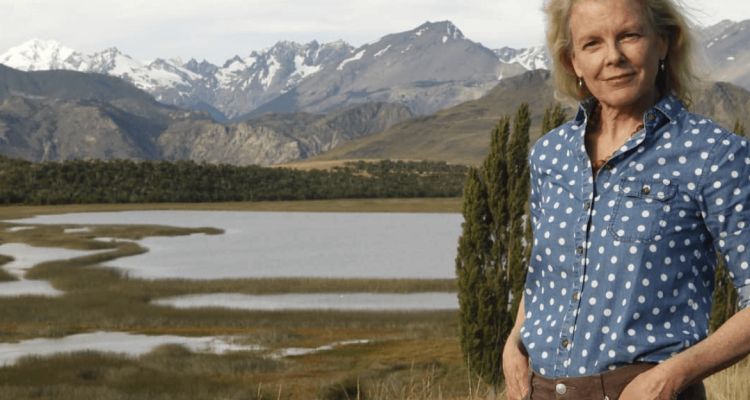Kristine Tompkins is an American conservationist, President and Cofounder of Tompkins Conservation, former CEO of Patagonia, Inc. and the newly designated UN Environment Patron of Protected Areas. Over the past 25 years her conservation work has led to numerous victories for the planet. Recent accomplishments include the birth of two Jaguar cubs in Iberá Park in Argentina, where the species has been absent for decades. In July, Tompkins met with Pope Francis where the two discussed global conservation strategies. She recently visited the United Environment in Nairobi to talk about her story and the future of protected areas.

Below are selected quotes from the discussion. Some have been edited for brevity. You can watch the full interview here.
Moving from the business world to conservation
“My husband Doug was the founder of The North Face company and I’m one of the founders of Patagonia, Inc. I worked there for 23 years in parallel to Doug’s world, when we decided we wanted to get out of business and start working in conservation. We had grown up as ski racers and climbers and Doug was a gifted kayaker. So, we understood fairly early on in our development that something grave was happening to the natural world—that economic development was subsuming any other interests that most cultures had. We got out of our business lives and moved our base of operations to Chile and Argentina.”
A rocky start
“We initially decided to focus our work on the acquisition of large scale properties and bought half a million acres of temperate rainforest to start with. This started real chaos in Chile. We became known as the couple who cut the country in half, along with a lot of other unmentionable names, because the parks in their earliest form ran from the border of Argentina out to the Pacific Ocean. There was a tremendous social, cultural and economic reaction.”
Building trust
“People didn’t understand at first why we would buy large tracts of land just to protect it. The first four years were rough, but we kept on building infrastructure for visitors. Little by little, people understood that they could visit the parks, there was public access, they could hike on the trails, camp at the campgrounds, and so on. That got rolling and by the mid-1990s, we expanded our operations into Argentina. Over the last 25 years, we have created 13 national parks, protecting just over 13 million acres in Chile and Argentina with our partners.”
The challenge of protecting areas
“Buying land, that was the core of our work at first. The easiest thing we ever did was secure the property, sign the check and let the ink dry. But really that’s when the work begins, when you start to focus on restoration and protection. It’s a never-ending battle, and it’s only going to increase. The big challenge now is not only establishing new parklands; it’s also defending existing protected areas from development.”
Why national parks are important
“Every country has its own particularities and what works in Chile and Argentina may not work in the exactly same form someplace else. But if you look at national parks around the world, they work. Countries go through periods of instability, but even in difficult times protected areas seem to squeak through. I really believe in the system of national parks. If you want to build an army of people who love nature, you have to get them out into it. You can’t protect a place unless you understand it. You can’t love it until you know it.”
Why people should care about conservation
“Conservation is not the problem, the global economy is the problem. The shift around what defines success. Success now is development and generally at all costs. It’s a moral necessity that we view all non-humans with an intrinsic worth of their own. They don’t need us to value them. They have value. The problem is that we’re stealing from nature
and from future generations.”
The role of the UN and other institutions in protecting the environment
“There needs to be a unifying voice from global institutions such as the UN. You need to look hard at what you as an institution are fighting for. And I know there are a lot of issues to deal with, but I just don’t hear a clarion call from the UN and other global entities, that at the heart of our future lies the necessity to rein ourselves in. To move in the right direction, it will take leadership and a sea change in the worldview we have today. This is not the time for anyone to be quiet, or polite, because this is happening. Silence assures the future.”